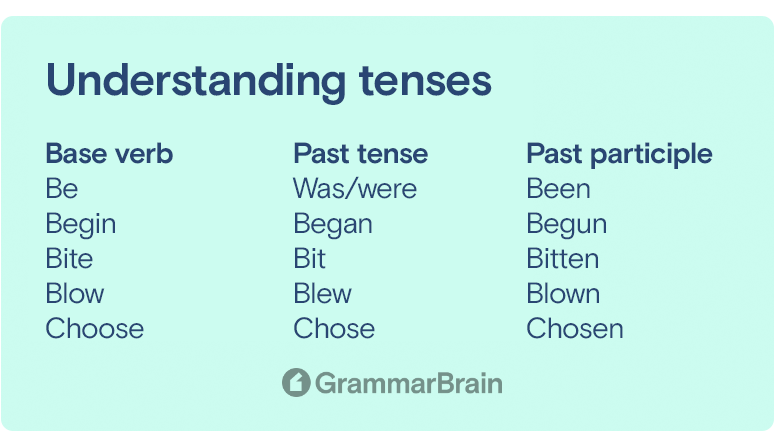What is the past tense of “mean?” Most commonly, the past tense of the word “mean” is “meant.” Although the word form will change based on its participle. And the sentence where it’s used. For example, referencing “mean” in the present participle form will change it to “meaning,” but in the infinitive form, will be “mean.”
What is the past tense of the word "mean"
The past tense (past participle) form of “mean” is “meant.” The infinitive of the word form is “mean.” The present participle form is “meaning.” The past tense form is “meant” and past participle form is “meant.”
Understanding verb tenses
The general grammar rules that govern past tenses are as follows. The simple past tense form is created by adding a -ed or -d affix to the root word of the verb. Some verbs use a -t variation where they end in a -t. For example, when "dream" turns into "dreamt."
The past perfect tense is formed for regular verbs (ending in -ed, -d, or -t) by adding "had" followed by the verb. For example, "I had finished."
The past continuous tense is formed by the verb "be" followed by the affix or ending of -ing. For example, "we were having dinner."
Lastly, the past perfect continuous tense is formed by adding "had been" followed by the affix or ending of -ing. For example, "I had been building a castle with my sister."
For more information on forming all past tenses, visit our "understanding verb tenses" resource.
Sentence examples for the past tense of the word "mean"
- Infinitive: I mean.
- Present participle: She is meaning.
- Past tense: I meant.
- Past particle: I have meant.
Verb forms of the word "mean"
Example sentences in all verb forms:
Indefinite present tense
I mean.
Present continuous tense
She/he/it is meaning.
Present perfect continuous tense
She/he/it has/had meant.
Present perfect tense
She/he/it has/had been meaning.
Simple past tense
She/he/it meant.
Past continuous tense
She/he/it were meaning.
Past perfect tense
She/he/it has/had been meaning.
Perfect continuous tense
She/he/it will/shall mean.
Simple future tense
She/he/it will/shall be meaning.
Future perfect tense
She/he/it will/shall have meant.
Future perfect continuous tense
She/he/it will/shall have been meaning.
Sentence examples in all forms
Sentence examples in all participles and parts of speech:
| Verb Tense | Example sentence |
| Simple Present Tense | I mean |
| Present Continuous Tense | She/he/it meaning |
| Present Perfect Tense | She/he/it has/had been meaning |
| Simple Past Tense | She/he/it meant |
| Past Continuous Tense | She/he/it were meaning |
| Past Perfect Tense | I had meant. |
| Past Perfect Continuous Tense | She/he/it has/had been meaning |
| Simple Future Tense | She/he/it will/shall be meaning |
| Future Continuous Tense | I will be meaning. |
| Future Perfect Tense | She/he/it will/shall have meant |
| Future Perfect Continuous Tense | She/he/it will/shall have been meaning |
Fact checked:
Content is rigorously reviewed by a team of qualified and experienced fact checkers. Fact checkers review articles for factual accuracy, relevance, and timeliness. Learn more.
Core lessons
Glossary
- Abstract Noun
- Accusative Case
- Anecdote
- Antonym
- Active Sentence
- Adverb
- Adjective
- Allegory
- Alliteration
- Adjective Clause
- Adjective Phrase
- Ampersand
- Anastrophe
- Adverbial Clause
- Appositive Phrase
- Clause
- Compound Adjective
- Complex Sentence
- Compound Words
- Compound Predicate
- Common Noun
- Comparative Adjective
- Comparative and Superlative
- Compound Noun
- Compound Subject
- Compound Sentence
- Copular Verb
- Collective Noun
- Colloquialism
- Conciseness
- Consonance
- Conditional
- Concrete Noun
- Conjunction
- Conjugation
- Conditional Sentence
- Comma Splice
- Correlative Conjunction
- Coordinating Conjunction
- Coordinate Adjective
- Cumulative Adjective
- Dative Case
- Determiner
- Declarative Sentence
- Declarative Statement
- Direct Object Pronoun
- Direct Object
- Diction
- Diphthong
- Dangling Modifier
- Demonstrative Pronoun
- Demonstrative Adjective
- Direct Characterization
- Definite Article
- Doublespeak
- False Dilemma Fallacy
- Future Perfect Progressive
- Future Simple
- Future Perfect Continuous
- Future Perfect
- First Conditional
- Irregular Adjective
- Irregular Verb
- Imperative Sentence
- Indefinite Article
- Intransitive Verb
- Introductory Phrase
- Indefinite Pronoun
- Indirect Characterization
- Interrogative Sentence
- Intensive Pronoun
- Inanimate Object
- Indefinite Tense
- Infinitive Phrase
- Interjection
- Intensifier
- Infinitive
- Indicative Mood
- Participle
- Parallelism
- Prepositional Phrase
- Past Simple Tense
- Past Continuous Tense
- Past Perfect Tense
- Past Progressive Tense
- Present Simple Tense
- Present Perfect Tense
- Personal Pronoun
- Personification
- Persuasive Writing
- Parallel Structure
- Phrasal Verb
- Predicate Adjective
- Predicate Nominative
- Phonetic Language
- Plural Noun
- Punctuation
- Punctuation Marks
- Preposition
- Preposition of Place
- Parts of Speech
- Possessive Adjective
- Possessive Determiner
- Possessive Case
- Possessive Noun
- Proper Adjective
- Proper Noun
- Present Participle
- Prefix
- Predicate



